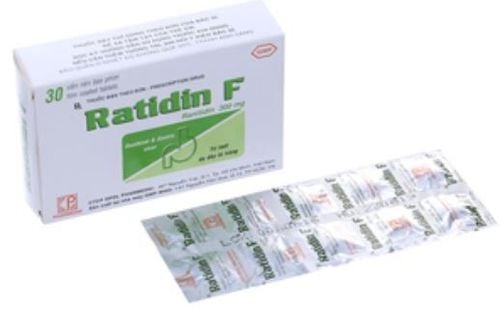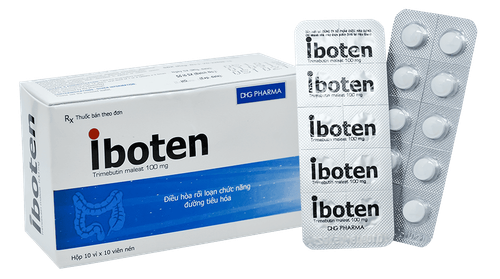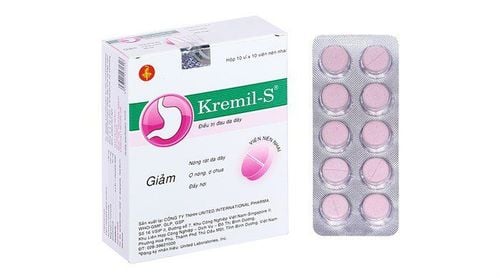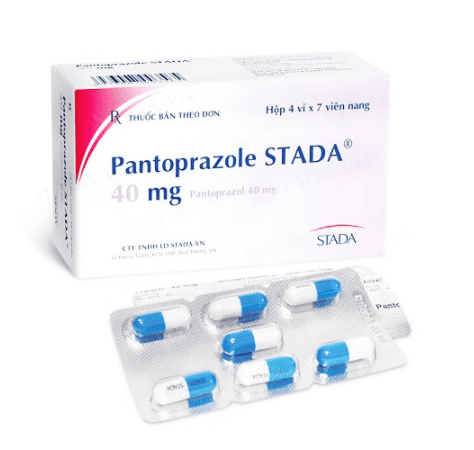This is an automatically translated article.
Ratidin F drug with the main ingredient is Ranitidine 150mg is indicated for the treatment of gastrointestinal diseases. To ensure the effectiveness of treatment, patients need to take the drug according to the prescription, carefully read the instructions for use and follow the correct dosage of the doctor or pharmacist.
1. What is Ratidine F?
Ratidin F drug has the main ingredient Ranitidine 150mg (equivalent to 168mg Ranitidine hydrochloride) and the excipient system includes: Erapac, avicel, talc, povidone, magnesium stearate, methocel, sodium starch glycolate, ethyl cellulose, PEG 6000, blue patent V, gold tartrazine, titanium dioxide, vanillin. Ratidine F is available as a film-coated tablet.
Ranitidine is an H2-histamine receptor antagonist, a drug that competitively inhibits histamine at the H2-receptor of the parietal cells, thereby reducing the amount of gastric acid secreted in the stomach during the day and night, both when stimulated by food, insulin, amino acids, the action of histamine or pentagastrin.
2. Uses of the drug Ratidine F
Ratidin F drug for duodenal ulcer, benign gastric ulcer and postoperative ulcer; Ratidine F is also effective in reflux esophagitis; Treatment of Zollinger-Ellison syndrome; Use Ratidine F in necessary cases to reduce gastric secretion and acid secretion in the stomach.

Thuốc Ratidin F được dùng trong điều trị một số bệnh lý dạ dày tá tràng
3. Dosage of the drug Ratidine F
3.1. Ratidin F dose to treat duodenal ulcer, benign gastric ulcer Dosage and time of use:
The patient takes 1 tablet of Ratidin F in the morning and 1 tablet of Ratidin F in the evening; Or take 2 tablets of Ratidin F in the evening; Treat with Ratidine F for 4 - 8 weeks; For patients with chronic gastritis, take Ratidin F for 6 weeks; For patients with ulcers caused by taking non-steroidal anti-inflammatory drugs, Ratidin F for 8 weeks; For patients with duodenal ulcer, you can take 2 tablets of Ratidin F/time, 2 times/day, continuously for 4 weeks to quickly heal the ulcer. 3.2. Ratidin F dose to treat reflux esophagitis Patient takes 1 tablet of Ratidin F in the morning and 1 tablet in the evening; Or take 2 tablets of Ratidin F in the evening; Treat with Ratidine F for 8-12 weeks. When the disease is cured, long-term maintenance treatment can be given with a dose of 1 tablet of Ratidin F/time, twice a day. 3.3. Ratidin F dose to treat Zollinger Ellison syndrome Patients take 1 tablet of Ratidin F / time, 3 times / day, can take up to 6g / day, divided into several times. 3.4. Ratidin F dose to reduce stomach acid, prevent acid aspiration in obstetrics Patients take 1 tablet of Ratidin F right at the time of labor, then every 6 hours to take it. 3.5. Dosage of Ratidin F for children The recommended dose of Ratidin F to treat peptic ulcers in children is: 2 - 4mg of Ranitidine/kg, orally twice a day, up to a maximum of 300mg of Ranitidine/day; Maintenance doses of 2-4mg of Ranitidine/kg, orally once a day, can be used, up to a maximum of 150mg of Ranitidine per day; Although little is known about the use of ranitidine for the treatment of reflux esophagitis and ulcerative esophagitis in children, a dose of 5-10 mg ranitidine/kg per day may be used in this case. usually divided into 2 times. 3.6. Dosage of Ratidin F in Renal Impairment According to reliable sources of ranitidine dosing recommendations, the dose of this drug should be reduced in patients with severe renal impairment. For patients with creatinine clearance less than 50 mL/min, an oral dose of 150 mg ranitidine/day is recommended, with caution to be increased up to 150 mg ranitidine every 12 hours if necessary.

Người bệnh nên tuân thủ liều dùng thuốc Ratidin F từ bác sĩ
4. Contraindications of Ratidine F
Contraindicated to use cough medicine in patients who are allergic to any ingredient of Ratidin F medicine.
5. Notes when using Ratidine F
Ratidin F dose should be adjusted in patients with impaired renal function; Ratidin F should be used with caution in patients with severe liver failure, acute porphyria, heart disease; The possibility that the patient has gastric malignancies should be excluded prior to treatment with drugs containing ranitidine. Ranitidine medicine can cause headache, dizziness, so do not drive or operate machinery while taking Ratidin F. At therapeutic doses, Ratidin F did not have any harmful effects on the pregnant mother, the delivery process and the health of the fetus; During lactation, Ratidine F should be used only when clearly needed.
6. Undesirable effects of the drug Ratidin F
Ratidine F can cause side effects: headache, dizziness, fatigue, diarrhea, erythema; Rare side effects of leukopenia, thrombocytopenia, pruritus and increased transaminases when using Ratidine F; Very rare hypersensitivity reactions to Ratidine F (urticaria, bronchospasm, anaphylaxis, angioedema, myalgia, arthralgia), agranulocytosis, pancytopenia, bradycardia, hypotension pressure, atrioventricular block, gynecomastia in men, pancreatitis, hepatitis, eye accommodation disorder...
7. Ratidin F drug interactions with other drugs
Ranitidine has very little inhibitory effect on liver metabolism of some other drugs such as: anticoagulants coumarin, theophylline, diazepam, propranolol; Concomitant administration of ranitidine with glipizide may result in a hypotensive effect, but this is uncommon; Ranitidine reduces the absorption of antifungal drugs such as: ketoconazole, fluconazole and itraconazole because ranitidine reduces gastric acid; Concomitant administration of ranitidine with clarithromycin may increase plasma concentrations of ranitidine; Concomitant administration of ranitidine with propanthelin bromide may increase peak plasma concentrations of ranitidine and delay drug absorption. Ratidin F drug with the main ingredient is Ranitidine 150mg is indicated for the treatment of gastrointestinal diseases. To ensure the effectiveness of treatment, patients need to take the medicine according to the prescription, carefully read the instructions for use and follow the correct dosage of the doctor or pharmacist.
Follow Vinmec International General Hospital website to get more health, nutrition and beauty information to protect the health of yourself and your loved ones in your family.
Please dial HOTLINE for more information or register for an appointment HERE. Download MyVinmec app to make appointments faster and to manage your bookings easily.













